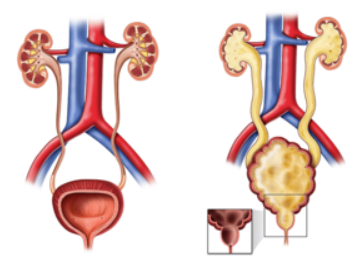Posterior Urethral Valves (PUV) – Insights from Dr. Prabhu Karunakaran, Pediatric Urologist in Hyderabad

Posterior Urethral Valves (PUV) is a congenital condition affecting male infants, where abnormal flaps of tissue in the urethra obstruct the normal flow of urine. This blockage can lead to urinary tract complications, kidney damage, and bladder dysfunction if left untreated. Early diagnosis and intervention are crucial to prevent long-term complications.
Understanding Posterior Urethral Valves (PUV)
PUV occurs during fetal development and is one of the most common causes of bladder outlet obstruction in newborn boys. The severity of obstruction varies, influencing the extent of urinary dysfunction and kidney impairment.
Symptoms and Diagnosis
Signs of PUV may include:
- Weak urinary stream or difficulty urinating
- Frequent urinary tract infections (UTIs)
- Enlarged bladder detected during prenatal ultrasound
- Poor weight gain and feeding difficulties in newborns
- Kidney swelling (hydronephrosis) due to urine buildup
Diagnosis is confirmed through imaging studies such as ultrasound, voiding cystourethrogram (VCUG), and cystoscopy, which allow a detailed view of the urinary tract.
Frequently Asked Questions About PUV Treatment in Children
What are Posterior Urethral Valves (PUV) in children?
Posterior Urethral Valves (PUV) are abnormal flaps of tissue in the urethra that block urine flow from the bladder. It mostly affects boys and requires timely treatment.
Is PUV a serious condition?
Yes. If left untreated, PUV can lead to urinary infections, bladder damage, or kidney failure. Early diagnosis and expert care can prevent complications.
What are the symptoms of PUV in babies or children?
Common signs include weak urine stream, difficulty urinating, urinary tract infections, swollen belly, or poor weight gain.
How is PUV diagnosed?
PUV is usually diagnosed through a combination of ultrasound, voiding cystourethrogram (VCUG), and sometimes cystoscopy.
What is the treatment for PUV?
The main treatment is endoscopic valve ablation (a minimally invasive surgery). In some cases, temporary catheterization or further interventions may be needed.
Who is the best doctor for PUV treatment in Hyderabad?
Dr. Prabhu Karunakaran is a highly experienced pediatric urologist in Hyderabad, specializing in treating PUV and other urinary conditions in children.
Is surgery safe for young children with PUV?
Yes. The procedure is safe and commonly performed. With an experienced pediatric urologist like Dr. Prabhu, outcomes are highly successful.
What is the recovery time after PUV surgery?
Most children recover quickly. Hospital stay is typically short, and follow-ups help monitor kidney and bladder function over time.
Treatment Approach
The primary goal of treatment is to relieve obstruction and protect kidney function. Treatment options include:
- Endoscopic Valve Ablation: A minimally invasive procedure using a cystoscope to remove the obstructing tissue, restoring normal urine flow.
- Vesicostomy (in Severe Cases): A temporary opening in the bladder to allow drainage and relieve pressure.
- Long-Term Monitoring: Regular follow-ups to assess kidney function, bladder health, and urinary control as the child grows.
Expert Care for PUV
As a Pediatric Urologist in Hyderabad, I specialize in the diagnosis and management of complex urological conditions like PUV. My approach focuses on early detection, minimally invasive treatments, and comprehensive follow-up care to ensure the best possible outcome for your child. If your child has been diagnosed with PUV or is showing symptoms, early intervention can make a significant difference. Schedule a consultation today to discuss the best treatment options for your child’s urinary health.


